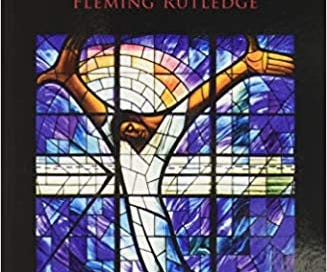When it comes to the atonement, there’s some classic evangelical books around. In defense of penal substitutionary atonement (PSA) there is: John Stott’s The Cross of Christ and Mike Ovey et al, Pierced for our Transgressions. I like these, I refer to them often, and point students to them.
However, if you want to be stretched, consider that PSA is not the only atonement game in town, and consider something a bit broader, I’d recommend these:
Scot McKnight, A Community Called Atonement. Very good for students, readable, easy to digest, and wisely points out that the NT has more than one view of Jesus’ death and its effect.
Fleming Rutledge, The Crucifixion. I cannot recommend this book warmly enough. Terrific defense of substitutionary atonement. Thorough, detailed, and yet written with a preacher’s heart.
Peter Leithart, Delivered from the Elements of the World: Atonement, Justification, Mission. Okay, this is different, mixing of social theory and covenant theology, but Leithart is a Presbyterian immersed in the Old Testament.
N.T. Wright, The Day the Revolution Began. Wright’s big book on Paul and the atonement, get ready to be de-platonized, catch some big Christus Victor, and bask in the glory of the mercy seat.
Greg Boyd, The Crucifixion of the Warrior God. Okay, I need to sit down with Greg one day, because I don’t remotely see the attraction of open theism and the attempt to treat God as a recovering rageaholic, but hey, I’m willing to learn and be challenged.
William Lane Craig, Atonement and the Death of Christ. Philosophically rigorous, but comes out in defense of PSA. Not so much biblical as a more crisp logical approach to the topic.
Graham Cole, God the Peacemaker, a book reflecting the Aussie biblical-theology tradition as well as historical and systematic interests. Robust and sensible, in many ways, an ideal textbook for beginning students.
Eleonore Stump, Atonement. This is relatively recent, I haven’t read it myself, but Stump is a great theistic philosopher, I’ve heard good things about this book. Yes, it is analytic theology, but I’m sure it won’t be that boring.
Joshua McNall, The Mosaic of Atonement. This is my kind of book, cast the net wide, don’t focus too much on one aspect of the atonement. Take it all in and synthesize.
Michael Gorman, The Death of the Messiah and the Birth of the New Covenant. This book is, much like Boston in winter, horribly underrated. Gorman is a great exegete with sensitivity to theological texture. He’s nobody’s stooge and thinks independently.
Look there are so many other books I could recommend to you, but these are the ones I get students to choose from to do a comparative book review.
Any books I missed? Which ones would you put on the list?





Mike, I know this post is a couple of years old but I’m trying to get caught up.
Regarding Greg Boyd, have you had a chance to talk with him about Open Theism? If not, I would love to hear a discussion between you and him about Calvinism and Open Theism.
Also, in your comment about The Crucifixion of the Warrior God, you mention that the book is an attempt to treat God as a recovering rageoholic. Can you expand on that comment and what Boyd says that points that direction?
Thanks for all you do for the Kingdom! Blessings!